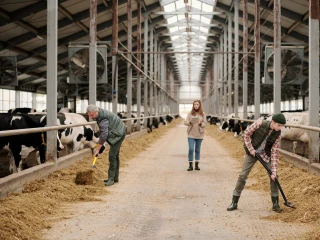A model candidate
“What we liked about RumeXperts as a candidate? They had already made a lot of headway with their project. They had a clear vision about what they wanted to achieve,” Antoine continues. “What’s more, such an initiative in the Walloon agri-food industry, where farmers are slow in adopting AI, may inspire other market players. It demonstrates how technology can lead to solutions, with real added value for the farming industry.”
This is where delaware came in. According to Antoine, “delaware is part of a pool of some fourty AI experts that we rely on for support. The challenge when choosing an expert is to find the best possible match between the company requiring support and the expert providing it. In the case of RumeXperts, delaware was a natural fit. Why? Firstly, because they already have considerable expertise in the agri-food industry, but also because they had already overseen similar projects, therefore perfectly meeting RumeXperts' expectations.”
According to delaware Senior Manager Data & AI Benoît Loffet, “We have been participating in these Digital Wallonia support projects since they were first launched. It’s always a pleasure to work with them because the concept’s extremely agile approach allows us to really hit the ground running. The variety of missions gives us a better understanding of the core business of companies across various industries. This understanding of the key challenges they face is fundamental to making sense of the data that is collected.”
“We rely on a team of 140 data specialists. Thanks to their excellent command of Microsoft and SAP, these experts can define strategies, set up modern data platforms in the Cloud, develop reporting systems, create AI algorithms, and help companies manage any changes resulting from this new way of working. Léonard and his team had a very good idea of both what they had achieved so far and what their next step would be. They already had a platform to collect their own data. The starting premise was ideal, with everything crystal clear right from the off.”

.png)
